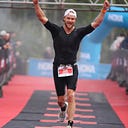Beyond Ordinary: A Quest for Optimal Health and Longevity
Insights, Practices, and Reflections on the Pursuit of an Exceptional Existence
If you’ve any of my articles, you’re aware of my deep interest in health and well-being. It all began with a passion for staying active, achieving fitness milestones, and experiencing a positive transformation in how I looked and how I felt. However, the turning point came a few years ago when I lost my father unexpectedly, prompting me to take a closer look at premature loss within my community.
Allow me to clarify. I come from a small town where everyone seems to know one another. Although I no longer live there, I frequently visit my mom, who still receives the printed version of the newspaper. During my visits, I often read the newspaper, which has a memorial ad section. This section and the people mentioned there, have become a regular topic of discussion for us.
It’s astonishing how many individuals I recognize who fall ill or pass away prematurely. Sadly, it seems normal these days for people to leave us between the ages of 50 and 70.
Recently, several acquaintances, younger than myself, battled and succumbed to cancer, and it deeply affected me. My aspiration is not just to reach the age of 100, but, more importantly, to lead a fulfilling and healthy life until my time arrives.
Unlocking Optimal Health
I recently found Gary Brecka, a renowned human biologist and biohacker. You might recognize him for his work with Dana White. In brief, Gary conducted tests on Dana, revealing a myriad of health issues without Dana disclosing any information. Shockingly, Gary predicted Dana had only 10 more years to live. Dana, dealing with various medical conditions and using multiple medications, followed Gary’s advice. Within weeks, most of his health indicators normalized, and he could discontinue all medications, including the CPAP machine for his sleep apnea.
That was the moment I became hooked. My Instagram feed is flooded with content related to Gary, and I immersed myself in podcasts featuring him. Another figure who’s been a significant influence on my health journey is Dr. Andrew Huberman, a distinguished neuroscientist and a tenured professor at Stanford School of Medicine.
While Dr. Huberman covers a broader spectrum of topics compared to Gary, their content often intersects. From my perspective, their alignment on key principles provides a solid foundation of trustworthiness. When two experts concur on a matter, it holds considerable credibility.
Food and fasting
In recent years, my dietary choices have leaned towards clean eating, avoiding processed foods and sugar. I experimented with weeks of consuming only meat, chicken, fish, eggs, and nuts, feeling great. Contrastingly, a weekend of indulging in sugar left me sluggish, fatigued, and constantly hungry. It highlighted the addictive nature of sugar.
Intermittent fasting became a part of my routine, driven by the belief in giving the body time to process everything it’s fed. Periodic longer fasts reinforce the understanding that much of our “hunger” is habitual.
As always, I seek multiple benefits from practices. While I can’t peer into my body to observe the effects of fasting, I measure its impact based on how I feel, trusting the experts that it contributes positively. Fasting demands discipline, another reason why I embrace it.
First light, breathwork, icebaths
Both Gary and Dr. Huberman advocate a morning routine encompassing exposure to “first light,” Wim Hof-style breathing exercises, and ice baths or cold showers.
- Getting “first light” in the morning resets cortisol and melatonin receptors, aiding circadian rhythm and improving nighttime sleep.
- Wim Hof-style breathing involves three rounds of 30 deep breaths followed by a breath hold, promising benefits such as increased energy, reduced stress, improved immune system, and better sleep.
- Ice baths or cold showers, despite claimed benefits like muscle repair and fat-burning, captivate me for the elevated mood they induce. Studies have shown that ice baths or showers may increase your dopamine level by 250%, which is the same as for cocaine. While the dopamine rise from cocaine crashes after a few minutes, the dopamine rise from ice baths or showers is a steady rise for up to 3 hours.
Living in Finland, where sunlight is scarce for months, I use a “daylight therapy lamp” in the morning in the wintertime.
Breathwork doubles as meditation for me, offering a unique focus on the body. Cold showers, though initially daunting, become a daily habit with remarkable mood-lifting effects.
The essence here is that even if these practices lengthen lifespan and offer health benefits, the true measure lies in daily well-being. Trusting the process and embracing how you feel daily is paramount. While these practices can’t be precisely quantified, the tangible result is feeling great each day, a mere 15-minute investment that fuels a positive mood and productivity.
